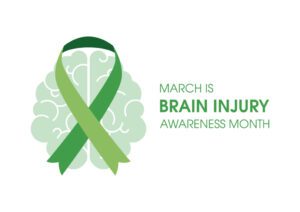March brings National Brain Injury Awareness Month. It’s the perfect time to not only learn about brain injuries but also dive into ways to learn how to avoid them. The CDC together with several other health-related groups work to educate people on preventing traumatic brain injuries and provide tips for handling these for loved ones.
Did you know that there are more than 5 million individuals in the United States living with a disability related to a traumatic brain injury? Each year, approximately 1.5 million people suffer from brain injuries in the U.S.
Common Causes of Brain Injuries
Most brain injuries are the result of a number of different types of accidents. This could be something that happens at home, in the workplace, or even during sports and play.
Here are some common activities that are leading causes of traumatic brain injuries:
- Car accidents
- Workplace injury
- Falls
- Sports
- Being struck by an object
- Playground equipment
- Child abuse
- Military activity
A concussion is one common form of brain injury that is the result causes your brain to move inside of the skull. It’s typically like a sharp jolt to the brain. In turn, the brain can be injured.
Know the Signs of Brain Injury
While you might be easily able to identify an accident that could cause a brain injury, there are also times it might not be immediately noticeable. There are certain symptoms to watch for. If a concussion is suspected, these are symptoms the doctor might tell you to look for.
- Persistent headaches
- Losing consciousness
- Dizziness and related vision problems
- Ringing ears
- Feeling “off”
These are not the only symptoms. These telltale signs are among the most common. However, an individual who has suffered a traumatic brain injury might also experience vomiting, slurred speech, light sensitivity, seizures, pupil dilation, or loss of coordination.
Preventing Brain Injuries
Not all brain injuries can be prevented. However, there are little things to be done that can go a long way in reducing or preventing injury.
It’s really all about being proactive and doing basic things to protect your head. Here are a few things that could help.
- Workplace safety
- Training
- Safe driving
- Proactively preventing fall or slip scenarios
- Awareness of injuries and causes
- Helmets for certain activities
Just to name a few!
How a Brain Injury Might Impact You
Some people experience a brain injury like a concussion and never experience major side effects. Unfortunately, the numbers show us that is not always the case.
Someone who lives with a traumatic brain injury could experience major side effects. This ultimately depends on the severity of the injury. This could cause the injured to need help with their daily living activities or even to need around-the-clock care.
Some survivors are able to adapt while others will need help with certain things for the rest of their lives.
Taking Part in Brain Injury Awareness Month
March has been designated as Brain Injury Awareness Month in an effort to raise awareness. The goal is to make sure people know and understand the risks and that they take action to try to prevent said injuries.
You can take part by engaging safely in all activities and by spreading the word to others.
Contact Bear Law
If you or a loved one have suffered a brain injury from an accident, you can count on an experienced personal injury lawyer at Bear Law to fight for your right to fair compensation for your injuries.
Bear Law has decades of experience in handling important cases like yours. Our experienced California personal injury lawyers protect the rights of the injured throughout Orange County, California.
Contact us to schedule your free initial consultation to discuss your case.
